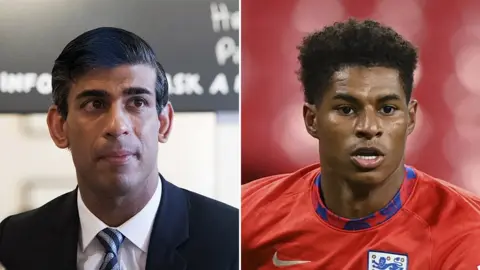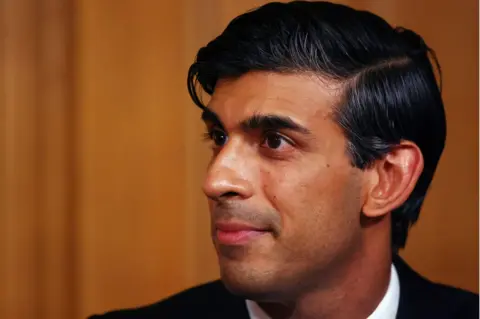Free school meals: Rishi Sunak says government has 'provided resources'
 Getty Images/Reuters
Getty Images/ReutersThe chancellor says the government has already given money to councils in England for free school meals in the holidays.
Rishi Sunak says they are "absolutely committed" to making sure vulnerable children do not go hungry.
But councils say the money they were given in the summer had to be spent within 12 weeks.
Footballer Marcus Rashford's campaign has built pressure on ministers to feed children directly.
It led to businesses across the country including fish and chip shops, pubs, restaurants and cafes dishing out free food to eligible children over half-term.
Sunak says the narrative that the government voted against free school meals is not fair, because they provide them in term time.
And some Conservative MPs have expressed concerns that extending this to school holidays would mean families become dependent in the long term on government-funded meals.
"We've invested billions of pounds in universal credit and housing allowances," Rishi Sunak tells BBC Radio 1 Newsbeat.
"We've got to be able to trust local councils to make decisions for their people."
He adds: "We have provided recourses for local authorities to help in a targeted way the most vulnerable children that they need to look after."
The chancellor - who's in charge of the UK economy - was speaking at an event to promote the government's Kickstart jobs scheme for under-25s.

Where's the money coming from?
By BBC Reality Check
Prime Minister Boris Johnson told the BBC on Monday: "There's £63m specifically to help deal with holiday hunger and with pressure on families," referring to payments made to local authorities in June.
The Local Government Association, which represent councils, agrees this type of funding is the best way of reaching children who need food support.
However, the £63m was for a "local welfare assistance fund" to "assist those struggling to afford food and other essentials" and was not just to feed children.
Guidance for the funding stated that the government "anticipates that most of the funding will be spent within 12 weeks", meaning that it was expected to have been spent before the end of September.

Who gets free school meals?
In England, children living in households on income-related benefits (such as universal credit) are eligible for free school meals, as long as their annual household income does not go over £7,400 after tax, not including welfare payments.
This is the same in Wales and Scotland, while in Northern Ireland the cap is set at £14,000 a year.
If a child is eligible, their parent or guardian can claim at any age - from pre-school to further education.
In England and Scotland, all infant state school pupils (those in reception, year 1 and year 2) can get free school meals during term time - regardless of their household income.
Scotland, Wales and Northern Ireland have introduced food voucher schemes for the holidays.

 PA Media
PA MediaWhat new help is there for getting a job?
This month sees the end of the furlough scheme which has been paying up to 80% of people's wages.
The chancellor told Newsbeat his priority is "protecting people's jobs and providing people with new opportunities".
Despite the government borrowing record amounts of money to support salaries, Rishi Sunak says the government will not stop planned investment in the north of England.
"I want my constituents to have the same opportunities as every one else does", says the MP who represents Richmond, North Yorkshire.
He wants more under-25s who are at risk of losing their jobs to use the Kickstart employment scheme.
"Many of you are probably applying for jobs and finding it difficult, [also] people who've graduated from university. That's tough, that's not usually the case".
For each "Kickstart" job, the government will cover the cost of 25 hours' work a week at the National Minimum Wage - £4.55 for under 18s, £6.45 for 18 to 20-year-olds, and £8.20 for 21 to 24-year-olds.
Employers will be able to top up that payment if they wish.
The scheme runs until December 2021 - with the option of being extended.
It has similarities to Labour's Future Jobs Fund from 2009.
Last month there were 529,400 people aged 18-24 claiming unemployment related benefits - an increase of 125% since March.


